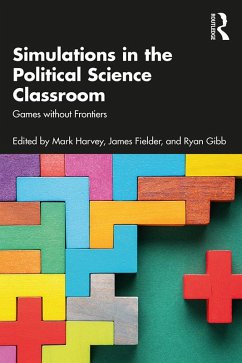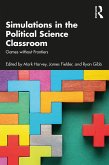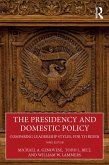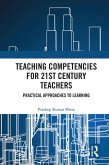Simulations in the Political Science Classroom (eBook, ePUB)
Games without Frontiers
Redaktion: Harvey, Mark; Gibb, Ryan; Fielder, James
39,95 €
39,95 €
inkl. MwSt.
Sofort per Download lieferbar

20 °P sammeln
39,95 €
Als Download kaufen

39,95 €
inkl. MwSt.
Sofort per Download lieferbar

20 °P sammeln
Jetzt verschenken
Alle Infos zum eBook verschenken
39,95 €
inkl. MwSt.
Sofort per Download lieferbar
Alle Infos zum eBook verschenken

20 °P sammeln
Simulations in the Political Science Classroom (eBook, ePUB)
Games without Frontiers
Redaktion: Harvey, Mark; Gibb, Ryan; Fielder, James
- Format: ePub
- Merkliste
- Auf die Merkliste
- Bewerten Bewerten
- Teilen
- Produkt teilen
- Produkterinnerung
- Produkterinnerung

Bitte loggen Sie sich zunächst in Ihr Kundenkonto ein oder registrieren Sie sich bei
bücher.de, um das eBook-Abo tolino select nutzen zu können.
Hier können Sie sich einloggen
Hier können Sie sich einloggen
Sie sind bereits eingeloggt. Klicken Sie auf 2. tolino select Abo, um fortzufahren.

Bitte loggen Sie sich zunächst in Ihr Kundenkonto ein oder registrieren Sie sich bei bücher.de, um das eBook-Abo tolino select nutzen zu können.
This book is premised on the assumption that games and simulations provide welcome alternatives and supplements to traditional political sceience lectures and class discussions.
- Geräte: eReader
- ohne Kopierschutz
- eBook Hilfe
- Größe: 1.31MB
Andere Kunden interessierten sich auch für
![Simulations in the Political Science Classroom (eBook, PDF) Simulations in the Political Science Classroom (eBook, PDF)]() Simulations in the Political Science Classroom (eBook, PDF)39,95 €
Simulations in the Political Science Classroom (eBook, PDF)39,95 €![Educating America's Military (eBook, ePUB) Educating America's Military (eBook, ePUB)]() Joan Johnson-FreeseEducating America's Military (eBook, ePUB)51,95 €
Joan Johnson-FreeseEducating America's Military (eBook, ePUB)51,95 €![The Imperial Presidency and American Politics (eBook, ePUB) The Imperial Presidency and American Politics (eBook, ePUB)]() Benjamin GinsbergThe Imperial Presidency and American Politics (eBook, ePUB)27,95 €
Benjamin GinsbergThe Imperial Presidency and American Politics (eBook, ePUB)27,95 €![Clientelism and Nationality in an Early Soviet Fiefdom (eBook, ePUB) Clientelism and Nationality in an Early Soviet Fiefdom (eBook, ePUB)]() Timothy BlauveltClientelism and Nationality in an Early Soviet Fiefdom (eBook, ePUB)40,95 €
Timothy BlauveltClientelism and Nationality in an Early Soviet Fiefdom (eBook, ePUB)40,95 €![The Scottish Office (eBook, ePUB) The Scottish Office (eBook, ePUB)]() David MilneThe Scottish Office (eBook, ePUB)33,95 €
David MilneThe Scottish Office (eBook, ePUB)33,95 €![The Presidency and Domestic Policy (eBook, ePUB) The Presidency and Domestic Policy (eBook, ePUB)]() Michael A. GenoveseThe Presidency and Domestic Policy (eBook, ePUB)44,95 €
Michael A. GenoveseThe Presidency and Domestic Policy (eBook, ePUB)44,95 €![Teaching Competencies for 21st Century Teachers (eBook, ePUB) Teaching Competencies for 21st Century Teachers (eBook, ePUB)]() Pradeep Kumar MisraTeaching Competencies for 21st Century Teachers (eBook, ePUB)42,95 €
Pradeep Kumar MisraTeaching Competencies for 21st Century Teachers (eBook, ePUB)42,95 €-
-
-
This book is premised on the assumption that games and simulations provide welcome alternatives and supplements to traditional political sceience lectures and class discussions.
Dieser Download kann aus rechtlichen Gründen nur mit Rechnungsadresse in A, B, BG, CY, CZ, D, DK, EW, E, FIN, F, GR, HR, H, IRL, I, LT, L, LR, M, NL, PL, P, R, S, SLO, SK ausgeliefert werden.
Produktdetails
- Produktdetails
- Verlag: Taylor & Francis eBooks
- Seitenzahl: 318
- Erscheinungstermin: 31. August 2022
- Englisch
- ISBN-13: 9781000634594
- Artikelnr.: 64309055
- Verlag: Taylor & Francis eBooks
- Seitenzahl: 318
- Erscheinungstermin: 31. August 2022
- Englisch
- ISBN-13: 9781000634594
- Artikelnr.: 64309055
- Herstellerkennzeichnung Die Herstellerinformationen sind derzeit nicht verfügbar.
Mark Harvey is an associate professor, honors program coordinator, and director of graduate programs at the University of Saint Mary in Kansas. James Fielder is an instructor at Colorado State University and a retired lieutenant colonel in the US Air Force. Ryan Gibb is an associate professor and the coordinator of international studies at Baker University.
Contents
List of Contributors
Preface and Acknowledgments
1 Jeux Sans Frontières: How Games Push the Frontiers of Learning
Mark Harvey, James Fielder, and Ryan Gibb
I. Pedagogical Foundations of Games and Simulations
2. Gaming to Lose: Learning from Failure in Classroom Games
James Fielder
3. "I am Che Guevara!": The Value of Roleplaying in Educational Experiences
Jennifer Shinefeld, Michael Surbrook, and Mark Harvey
4. An Argument for Lengthier, More Concrete, More Outcomes-Oriented Games
Edmond Hally
5. Making Game Design and Management Easy: Tips for the "Almost Convinced"
David Claborn and Mark Harvey
III. Designing and Teaching Games
6. Exploring Federalism and Interstate Relationships in the Classroom: An
In-Class 'Race to the
Bottom' Teaching Simulation
Derek Glasgow
7. Playing Politics: Utilizing Simulations to Expose Students to the
Factors that Shape Congressional Decision Making
Kellee J. Kirkpatrick, and James Stoutenborough,
8. Medicare-for-All or the Status Quo? Simulating Lobbying, Policy Debate,
and the Party Line in Congress
Lucy Britt
9. To Veto or Not to Veto: A Simulation of Presidential Decision Making
James Stoutenborough, Kellee J. Kirkpatrick, Johnathan W. L. Blakeman, and
James Pascali
10. Pick a Justice: Simulating Judicial Selection on the U.S. Supreme Court
Ryan J.Williams,
11. Using Moot Court in Introduction to Law Courses
Edward F. Kammerer, Jr.
12. A Congressional Election Simulation for a Small Class
Bruce F. Nesmith
13. A Game of Difference: The Effect of Role-playing Race, Gender, Sexual
Orientation, and Socioeconomic Class in a Political Theory Course
Edmond Hally
14. Taking a Risk: Can a Game on War Teach Students About Peace?
Mark Harvey
15. Model Diplomacy in the Classroom
Ryan Gibb
III. Conclusion
16. Games Without Frontiers: The Final Pieces of the Puzzle
List of Contributors
Preface and Acknowledgments
1 Jeux Sans Frontières: How Games Push the Frontiers of Learning
Mark Harvey, James Fielder, and Ryan Gibb
I. Pedagogical Foundations of Games and Simulations
2. Gaming to Lose: Learning from Failure in Classroom Games
James Fielder
3. "I am Che Guevara!": The Value of Roleplaying in Educational Experiences
Jennifer Shinefeld, Michael Surbrook, and Mark Harvey
4. An Argument for Lengthier, More Concrete, More Outcomes-Oriented Games
Edmond Hally
5. Making Game Design and Management Easy: Tips for the "Almost Convinced"
David Claborn and Mark Harvey
III. Designing and Teaching Games
6. Exploring Federalism and Interstate Relationships in the Classroom: An
In-Class 'Race to the
Bottom' Teaching Simulation
Derek Glasgow
7. Playing Politics: Utilizing Simulations to Expose Students to the
Factors that Shape Congressional Decision Making
Kellee J. Kirkpatrick, and James Stoutenborough,
8. Medicare-for-All or the Status Quo? Simulating Lobbying, Policy Debate,
and the Party Line in Congress
Lucy Britt
9. To Veto or Not to Veto: A Simulation of Presidential Decision Making
James Stoutenborough, Kellee J. Kirkpatrick, Johnathan W. L. Blakeman, and
James Pascali
10. Pick a Justice: Simulating Judicial Selection on the U.S. Supreme Court
Ryan J.Williams,
11. Using Moot Court in Introduction to Law Courses
Edward F. Kammerer, Jr.
12. A Congressional Election Simulation for a Small Class
Bruce F. Nesmith
13. A Game of Difference: The Effect of Role-playing Race, Gender, Sexual
Orientation, and Socioeconomic Class in a Political Theory Course
Edmond Hally
14. Taking a Risk: Can a Game on War Teach Students About Peace?
Mark Harvey
15. Model Diplomacy in the Classroom
Ryan Gibb
III. Conclusion
16. Games Without Frontiers: The Final Pieces of the Puzzle
Contents
List of Contributors
Preface and Acknowledgments
1 Jeux Sans Frontières: How Games Push the Frontiers of Learning
Mark Harvey, James Fielder, and Ryan Gibb
I. Pedagogical Foundations of Games and Simulations
2. Gaming to Lose: Learning from Failure in Classroom Games
James Fielder
3. "I am Che Guevara!": The Value of Roleplaying in Educational Experiences
Jennifer Shinefeld, Michael Surbrook, and Mark Harvey
4. An Argument for Lengthier, More Concrete, More Outcomes-Oriented Games
Edmond Hally
5. Making Game Design and Management Easy: Tips for the "Almost Convinced"
David Claborn and Mark Harvey
III. Designing and Teaching Games
6. Exploring Federalism and Interstate Relationships in the Classroom: An
In-Class 'Race to the
Bottom' Teaching Simulation
Derek Glasgow
7. Playing Politics: Utilizing Simulations to Expose Students to the
Factors that Shape Congressional Decision Making
Kellee J. Kirkpatrick, and James Stoutenborough,
8. Medicare-for-All or the Status Quo? Simulating Lobbying, Policy Debate,
and the Party Line in Congress
Lucy Britt
9. To Veto or Not to Veto: A Simulation of Presidential Decision Making
James Stoutenborough, Kellee J. Kirkpatrick, Johnathan W. L. Blakeman, and
James Pascali
10. Pick a Justice: Simulating Judicial Selection on the U.S. Supreme Court
Ryan J.Williams,
11. Using Moot Court in Introduction to Law Courses
Edward F. Kammerer, Jr.
12. A Congressional Election Simulation for a Small Class
Bruce F. Nesmith
13. A Game of Difference: The Effect of Role-playing Race, Gender, Sexual
Orientation, and Socioeconomic Class in a Political Theory Course
Edmond Hally
14. Taking a Risk: Can a Game on War Teach Students About Peace?
Mark Harvey
15. Model Diplomacy in the Classroom
Ryan Gibb
III. Conclusion
16. Games Without Frontiers: The Final Pieces of the Puzzle
List of Contributors
Preface and Acknowledgments
1 Jeux Sans Frontières: How Games Push the Frontiers of Learning
Mark Harvey, James Fielder, and Ryan Gibb
I. Pedagogical Foundations of Games and Simulations
2. Gaming to Lose: Learning from Failure in Classroom Games
James Fielder
3. "I am Che Guevara!": The Value of Roleplaying in Educational Experiences
Jennifer Shinefeld, Michael Surbrook, and Mark Harvey
4. An Argument for Lengthier, More Concrete, More Outcomes-Oriented Games
Edmond Hally
5. Making Game Design and Management Easy: Tips for the "Almost Convinced"
David Claborn and Mark Harvey
III. Designing and Teaching Games
6. Exploring Federalism and Interstate Relationships in the Classroom: An
In-Class 'Race to the
Bottom' Teaching Simulation
Derek Glasgow
7. Playing Politics: Utilizing Simulations to Expose Students to the
Factors that Shape Congressional Decision Making
Kellee J. Kirkpatrick, and James Stoutenborough,
8. Medicare-for-All or the Status Quo? Simulating Lobbying, Policy Debate,
and the Party Line in Congress
Lucy Britt
9. To Veto or Not to Veto: A Simulation of Presidential Decision Making
James Stoutenborough, Kellee J. Kirkpatrick, Johnathan W. L. Blakeman, and
James Pascali
10. Pick a Justice: Simulating Judicial Selection on the U.S. Supreme Court
Ryan J.Williams,
11. Using Moot Court in Introduction to Law Courses
Edward F. Kammerer, Jr.
12. A Congressional Election Simulation for a Small Class
Bruce F. Nesmith
13. A Game of Difference: The Effect of Role-playing Race, Gender, Sexual
Orientation, and Socioeconomic Class in a Political Theory Course
Edmond Hally
14. Taking a Risk: Can a Game on War Teach Students About Peace?
Mark Harvey
15. Model Diplomacy in the Classroom
Ryan Gibb
III. Conclusion
16. Games Without Frontiers: The Final Pieces of the Puzzle







